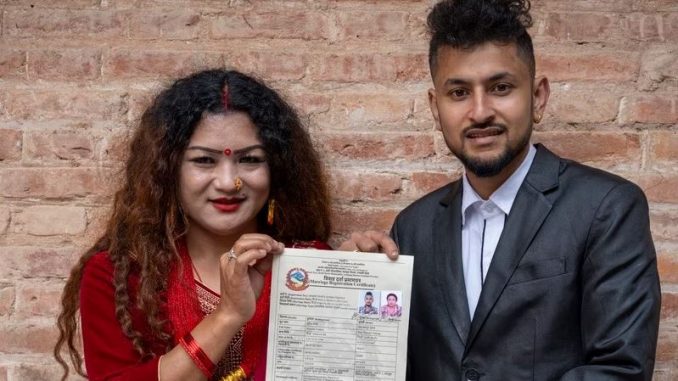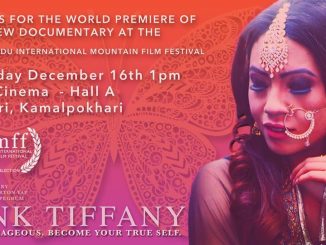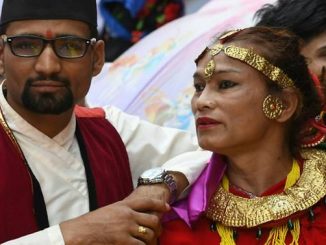
Surendra Pandey and Maya Gurung, the first gay couple in Nepal to have their same-sex marriage officially recognized, pledged on Friday to advocate for legal changes to facilitate similar unions. The couple successfully registered their marriage at a village council office in the mountains west of Kathmandu this week.
Pandey, a man, and Gurung, a transgender woman, faced challenges due to Nepal’s policy prohibiting citizens from changing the sex assigned at birth on official documents. Despite the recent legal recognition of their marriage, there are still pending updates in other areas of the law, such as inheritance, property rights, and the right to adopt children.
Speaking to reporters in Kathmandu, Gurung expressed their commitment to continue the campaign for same-sex marriage, aiming to bring about equality for sexual minorities in the country. The couple, alongside LGBTQ+ rights groups, had been advocating for legal registration for years, facing initial refusals even after a Supreme Court order earlier in the year.
The journey included legal battles led by Sunil Babu Pant, an openly gay former parliamentarian and LGBTQ+ rights activist. After facing rejections in the Kathmandu District Court and High Court, the Home Ministry recently made changes allowing local administration offices to register same-sex marriages.
Returning to Gurung’s village, the couple successfully registered their marriage, marking a historic moment for sexual minorities in Nepal. Pandey expressed joy, not just for themselves but for all sexual minority individuals who had eagerly awaited this day.
Nepal has now become the second country in Asia and the first in South Asia to officially recognize same-sex marriages. Activists emphasize that the inclusive provisions allow individuals to marry based on their sexual preference, embracing a diverse range of unions, including what is often referred to as a “rainbow marriage.”
Since 2011, Nepalis identifying outside the traditional male or female categories have had the option to choose “third gender” on official documents. The 2015 constitution explicitly prohibits discrimination based on sexual orientation.
Pant highlighted the inclusivity of the new provisions, stating, “It is not just same-sex marriage, but it is very inclusive.” He celebrated the fact that individuals can now marry based on their preferences, expanding the options beyond traditional male-female unions. Pant referred to it as a “rainbow marriage,” capturing the diverse spectrum of relationships now possible in Nepal.
The couple, who had previously married six years ago in a Hindu temple following tradition, now have legal recognition, marking a significant milestone in the fight for LGBTQ+ rights in Nepal.



Be the first to comment